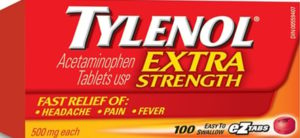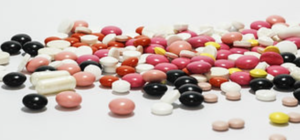Consumer Alert: The Deadly Reason Tylenol (also known as Paracetamol) Should Be Removed from the Market
Tylenol, a trademarked form of the chemical known as acetaminophen or paracetamol, is one of the most commonly used painkillers in the United States today, yet is also one of the most dangerous. For instance, nearly 500 die and 30,000 are hospitalized each year in the US as a result of its well established, yet seldomly discussed toxic effects.

Marketed by Johnson & Johnson primarily for pain and fever relief (including to highly vulnerable populations such as infants and children), few consumers are aware of the true extent of the risks it carries, as well as what safer, natural alternatives may exist, as documented by a growing body of biomedical and clinical literature.
For instance, a 2017 article published in Journal of Hepatology titled, Public Health: Acetaminophen (APAP) Hepatotoxicity–Isn’t It Time for APAP to Go Away? summarizes the alarming nature of Tylenol’s toxicity problem as follows:
“Acetaminophen (APAP) is the most commonly used drug for the treatment of pain and fever around the world. At the same time, APAP is capable of causing dose-related hepatocellular necrosis, responsible for nearly 500 deaths annually in the U.S. alone, as well as 100,000 calls to US Poison Control Centers, 50,000 emergency room visits and 10,000 hospitalizations per year. As an over-the-counter and prescription product (with opioids), APAP toxicity dwarfs all other prescription drugs as a cause for acute liver failure in the United States and Europe, but is not regulated in any significant way.”
The article points out that acetaminophen (APAP) is a “dose related toxin,” and that so-called APAP toxicity is the cause of 46% of all acute liver failure in the United States, and between 40-70% of all cases in Great Britain and Europe. Taken together, this exceeds the number of deaths related to acute liver failure (ALF) resulting from all prescription drugs combined.
According to the review, acetaminophen is a multi-billion dollar product, yet despite having the reputation of being extremely safe, and having little regulatory oversight of the FDA because it is an over-the-counter drug, it is “deadly.”
Recognition of this fact began a half century ago, as the drug became associated with suicide attempts, many of which were successful. A Lancet editorial from 1975 opined: “Surely the time has come to replace paracetamol [a synonym for acetaminophen] with an effective analogue which cannot cause liver damage.”
In 2016, a class action lawsuit with over 100 plaintiffs involving claims that Tylenol caused liver damage and death was settled by McNeil (an over-the-counter arm of Johnson and Johnson). As a result of the lawsuit, it was revealed that the FDA and McNeil/Johnson & Johnson delayed implementing suggestions to improve safety of acetaminophen despite its well known harms.
Should Tylenol Be Classified As A Neurotoxic Chemical with Psychiatric Effects?
While Tylenol’s liver-damaging effects are those most commonly recognized harmful effects by the medical community, few still seem to be aware of the accumulating research showing that Tylenol use has serious neurological and psychiatric impacts, including contributing to autism spectrum disorder, risk-taking behavior, attention deficit disorder and the blunting of emotional responses, including reducing human empathy (e.g. flat affect).
These possible consequences have been documented in depth in alternative media articles, which you can investigate further in the links below:
Attention Deficit Disorder with Hyperactivity and Tylenol
Risk-Taking Behavior and Tylenol
Empathy Reduction and Tylenol: Study 1
Empathy Reduction and Tylenol: Study 2
What should be highlighted is that in the risk-taking and empathy reduction studies a single 1,000 mg dose produced these adverse neurobiological and psychiatric effects. This is extremely concerning and likely indicates how toxic this chemical class is; especially since Tylenol’s pain- and emotion-blunting effects may actually reduce the taker’s awareness of its harmful effects.
What should be highlighted is that in the risk-taking and empathy reduction studies a single 1,000 mg dose produced these adverse neurobiological and psychiatric effects. This is extremely concerning and likely indicates how toxic this chemical class is; especially since Tylenol’s pain- and emotion-blunting effects may actually reduce the taker’s awareness of its harmful effects.
What Evidence-Based Natural Alternatives Exist to Prevent Tylenol Toxicity, or Might Replace it Completely?
There are a number of substances that have been studied to prevent or mitigate the adverse effects of Tylenol toxicity. In fact, the research community has investigated over 125 natural substances which may accomplish this, examples of which you can view on a Tylenol Toxicity database here.

What Evidence-Based Natural Alternatives Exist to Prevent Tylenol Toxicity, or Might Replace it Completely?
There are a number of substances that have been studied to prevent or mitigate the adverse effects of Tylenol toxicity. In fact, the research community has investigated over 125 natural substances which may accomplish this, examples of which you can view on a Tylenol Toxicity database here.
On Greenmedinfo.com there are also gathered a number of studies on natural substances that have been researched by the scientific community as possible alternatives to painkillers such as Tylenol. The following three natural substances have been studied in comparison with Tylenol, and have been found to compare favorably.
Ingesting a Turmeric-Boswellia formulation (1,000 mg daily for 7 days)
Consuming Sesame Seeds (40 grams a day for two months)
Topical application of Black Seed Oil (1 milliliter of black seed oil applied on the knee joint 3 times a day every 8 hours for 3 weeks.)
There are a far wider range of studies available on natural, evidence based alternatives to drugs like ibuprofen, another highly toxic (specifically, heart-damaging) drug, six of which can be read here: 6 Natural Ibuprofen Alternatives Backed by Clinical Research.
Aspirin, which has also recently fallen from grace as no longer recommended for the primary prevention of heart attack, has been studied alongside a pine bark extract which appears superior in a number of ways. You can learn more about this possible aspirin alterantive by reading: The Powerful Aspirin Alternative Your Doctor Never Told You About.
Beyond Popping Pills, Chemical or Otherwise
No matter what health complaints you may have, the primary advocacy is focused on the root-cause resolution of health problems. In 9 out of 10 cases, dietary modification and lifestyle transformations like more exercise and a beneficial way of thinking will go much farther in improving one’s well-being, happiness, and overall health metrics than popping a hand full of vitamins, or betting on magic bullets, regardless of whether they are “nutraceutical” or pharmaceutical.
If you have pain, your body is sending you a clear message that some aspects need to transform. The symptom is not an enemy, unless you treat it that way, and ultimately we all are on our own personal health journeys and need to discover the true causes – some physical, some emotional, and some spiritual – of what ails us.
References
1. 26. Lancet Editorial (unsigned) 1975 Dec 13:1189.
2. 2015, Propublica, “Johnson & Johnson Emerges Victorius in Lawsuit on Tylenol’s Risks“.
yogaesoteric
July 5, 2023
